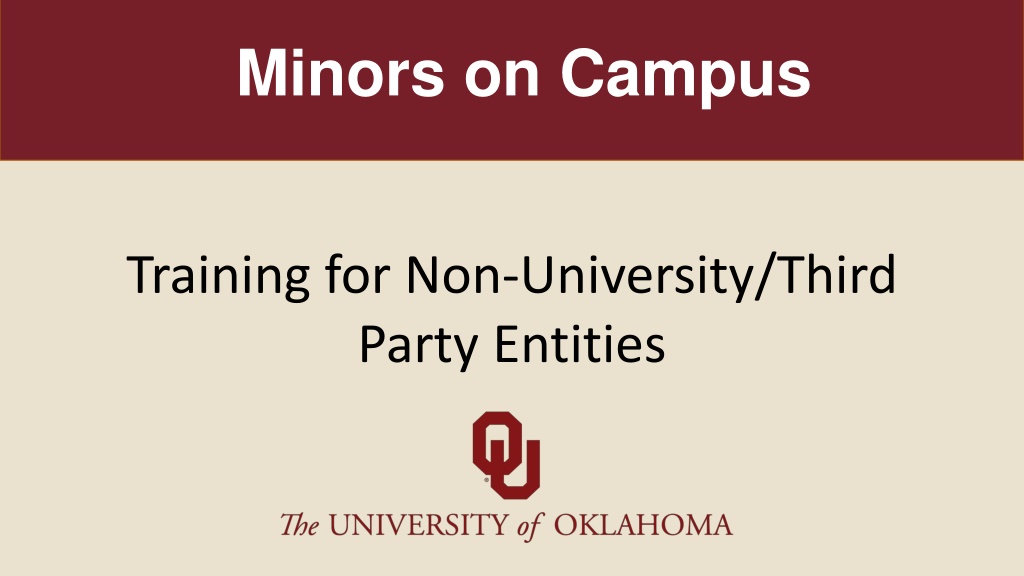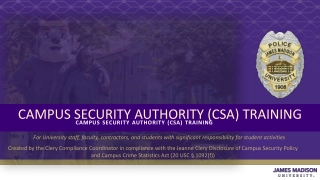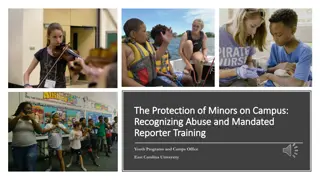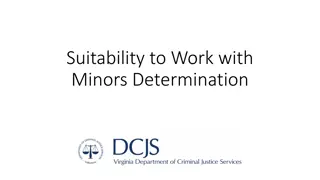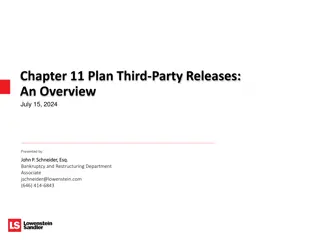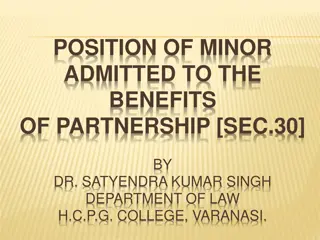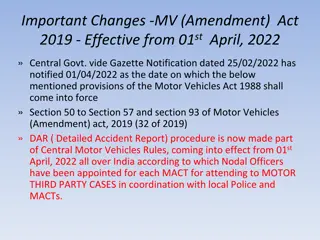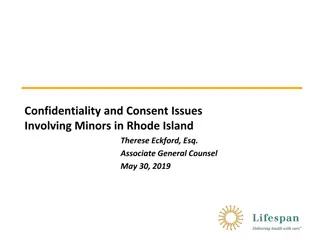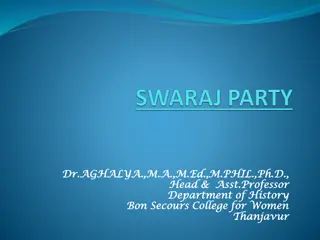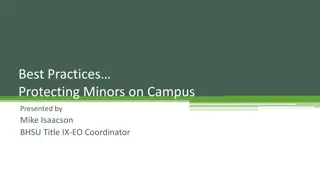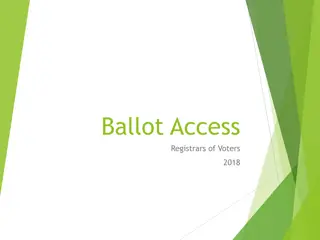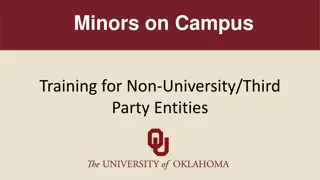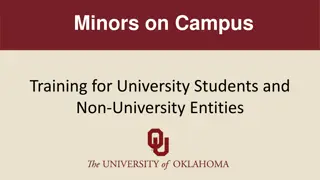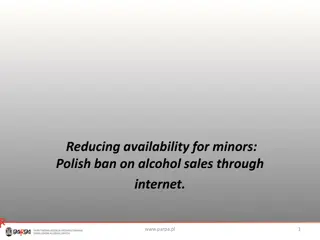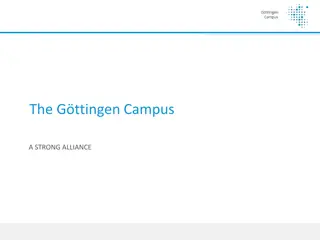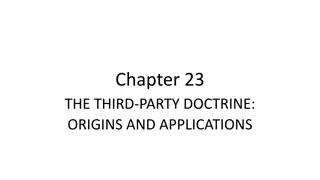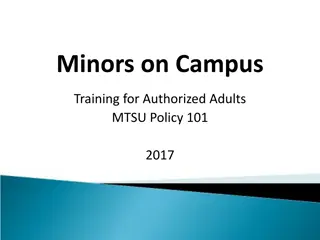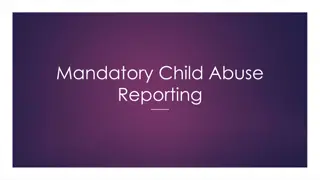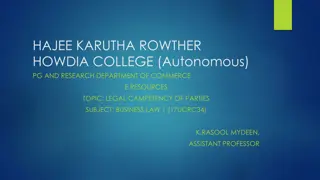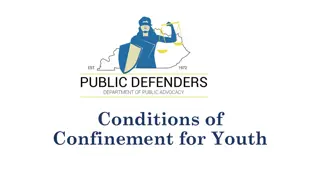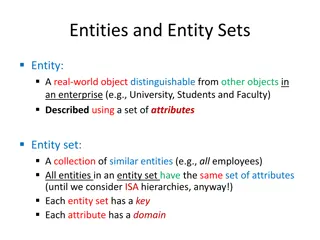Minors on Campus Training for Third Party Entities
This training provides guidance for working with minors on campus, focusing on Third Party sponsored events. It covers rules, requirements, and best practices for everyone responsible for minors on campus. Third Party sponsors must adhere to specific forms and agreements before hosting events involving minors. The training also defines who is considered a minor and emphasizes mandatory reporting of abuse or neglect concerning minors.
Uploaded on Sep 09, 2024 | 1 Views
Download Presentation

Please find below an Image/Link to download the presentation.
The content on the website is provided AS IS for your information and personal use only. It may not be sold, licensed, or shared on other websites without obtaining consent from the author. Download presentation by click this link. If you encounter any issues during the download, it is possible that the publisher has removed the file from their server.
E N D
Presentation Transcript
Minors on Campus Training for Non-University/Third Party Entities
This training is intended to serve as guidance for working with minors as they engage in valuable experiences on campus. It may not encompass each and every encounter with a minor and should be flexible depending on the circumstances. In this lesson, you will review the rules, requirements, and best practices for everyone responsible for minors on campus. While most of this lesson focuses on Third Party sponsored events and programs, this content applies to all situations where minors are present on campus.
Third Party Sponsored Programs In some situations, Third Parties such as schools, school districts, or extracurricular organizations may contact the University to use our space for events that include minors. If a University department agrees to provide space for this event, it must designate a departmental contact person who will be responsible for communicating University requirements to the Third Party sponsor of the event. The Third Party sponsors will be responsible for designating their own Head Supervisor to make sure minors are adequately supervised and to serve as a point of contact.
Required Forms for Third Party Events Third Party sponsors must sign a Facilities Use Agreement from the University department providing space; a copy of this agreement should be provided to the University s designated campus Enterprise Risk Management office. The agreement will include the cost of the leased space, the minimum insurance requirements, and liability and indemnification language protecting the University from claims that may arise out of the event. The sponsor must also file Form A (Event Acknowledgement Form), with any necessary modifications. Ensure that the parents or legal guardians of the minors attending the event file Form D (Minor's Release Form). Each sponsor must provide contact information for the event and submit all forms electronically to Risk Management prior to the event. If the event involves athletics on the Norman campus, the contact information and forms must be provided to the Event Management Office of the Department of Athletics.
Who is a Minor? A minor is anyone under the age of 18. This training applies to all minors who are brought to campus by Third Party organizations, faculty, staff, students, or visitors. This training does not apply to minors who are enrolled in University courses. Concurrently enrolled high school students and enrolled University students under the age of 18 are subject to all applicable University policies, including the Student Code of Rights and Responsibilities.
Mandatory Reporting Anyone who has reason to believe that a minor is the victim of abuse or neglect is required by law to report it immediately. This reporting obligation is on the person who suspects abuse. You do not have to know with certainty that abuse is taking place. You need only a reasonable belief or suspicion that child abuse has occurred. When in doubt, report it. If you suspect a child is a victim of abuse or neglect, crimes, and/or violations of the OU Title IX Policy, contact the following: Oklahoma DHS Hotline: 1-800-522-3511 Campus Police Department: 405-325-2864 (Norman), 405-271-4911 (HSC), 918-660-3333 (Tulsa) Title IX Office: 405-325-2215 (Norman), 405-271-2110 (HSC), 918-660-3107 (Tulsa)
Standard of Behavior All people involved in programs for minors are responsible for their own behavior around minors. You must maintain the highest code of conduct when interacting with them. Every action you take must demonstrate a commitment to safety and trust.
When interacting with minors it is important to remember these helpful standards of behavior: 1. Be friendly with minors, but maintain discipline and discourage inappropriate behavior. 2. Conduct any necessary one-on-one interactions with minors in a public environment where you can be observed. 3. Listen to minors and provide positive reinforcement. 4. Be consistent and treat every minor in a group fairly and with respect and dignity. 5. Be cognizant of how your words, actions, or intentions might be perceived and could be misinterpreted. 6. Consult with other adult supervisors if you feel uncertain about a situation.
Appropriate Touching As a rule, do not touch minors in a manner that a reasonable person could interpret as inappropriate. Appropriate touching that is generally acceptable includes shaking hands, high fives & hand slapping, hand signs & greetings, side hugs, and pats on the shoulder or back. Any touching must be consented by the minor and appropriate for the situation.
Inappropriate Touch Do not spend time alone with one minor away from the group or conduct private interactions where you can't be seen. Don't engage in inappropriate touching, or have any physical contact with a minor in private locations. Don't strike or hit a minor or use corporal punishment.
Inappropriate Behavior Don't use inappropriate language, tell risqu jokes, or make sexually suggestive comments around minors. Don't give personal gifts or do special favors for a minor or do things that may be seen as favoring one minor over others. Don't relate to minors as if they were peers and conduct private correspondence outside of program activities via email, text, or through social media. Don't date or become romantically or sexually involved with a minor. Don't provide alcohol or drugs to minors or use them in the presence of minors.
Appropriate vs Inappropriate Behavior Appropriate Inappropriate Giving a student a high-five after they set a personal best time running 50m Touching a student on the shoulder while they pull away Shaking a student s hand while teaching them to handle a job interview Laughing when one student dumps soda over another Encouraging a student enrolling at OU to consider a challenging degree program Providing candy containing cannabis to a minor experiencing anxiety Instructing students to be quiet while a Model United Nations delegate speaks Slapping a student s buttocks after scoring a run in softball Providing one-on-one tutoring with a student outside official hours
Explore: The Penn State Scandal The Penn State Scandal is one of the most notorious university child abuse scandal in American history. It is a prime example of what can happen when people neglect their responsibility to report child abuse. Beginning The Penn State Scandal started with Jerry Sandusky, an assistant coach for the Penn State Nittany Lions football team, engaging in sexual abuse of children over a period of at least 15 years. The abuse may have begun as early as the 1970s. Criminal Charges On June 22, 2012, Sandusky was convicted of 45 counts of sexual abuse. He was sentenced to a minimum of 30 years and a maximum of 60 years in prison. Impact The school president, vice president, & athletic director were charged with perjury, obstruction of justice, failure to report suspected child abuse, and related charges, though some were later dropped. Shortly after the scandal broke, the university president resigned and the Penn State Board of Trustees terminated the contracts of the athletic director and of the longtime head football coach. Report The Board of Trustees commissioned an independent investigation of the scandal. The Freeh Report stated that the President, Head Coach, Athletic Director, and Vice President had known about the child abuse allegations as early as 1998 and were complicit in failing to disclose them. The investigation found a "total and consistent disregard by the most senior leaders at Penn State for the safety and welfare of Sandusky's child victims," which "empowered" Sandusky to continue his abuse.
Bringing Minors to University Events The University hosts many events year-round where minors from the surrounding community are welcome to visit. These could include University-sponsored events, Third Party-sponsored events (including Registered Student Organizations), field trips and tours, or public events. The following rules and guidelines do not apply to: Campus visits and attendance at public events in which the minor is accompanied by their parent, adult family member or a responsible adult who is providing direct supervision of the minor or minors. Minors who are of legal driving age that attend events of their own accord. However, if a minor wants to attend a Third Party or a University-sponsored event that is not open to the general public, they must have written permission from a parent/legal guardian to participate. Minors who are enrolled as students.
Supervision Every minor participating in a Third Party-sponsored event must be supervised at all times. Each event shall designate at least one person as a Head Supervisor and provide his or her contact information to the University. Head Supervisor must ensure all minors are properly supervised and shall be the point of contact between the Event and the University. Supervisors must be at least 18 years old. Minors may not supervise other minors. Supervisors must maintain line of sight to all minors under their supervision.
Overnight Supervision Some situations may require minors to stay overnight or camp on campus.* A Head Chaperone must be designated when the campers are staying overnight and must provide all contact numbers to the housing representative. At least one chaperone must be on-call and present at all times to ensure that the minors are secure in their rooms. Designated chaperones may not leave the premises once minors are secure in their rooms. Smaller ratios for overnight supervision may be applicable where there are sufficient numbers of chaperones who are on call and they are able to maintain line of sight to the campers' rooms. *Due to Covid-19 Restrictions, no overnight camps will be allowed in the Summer of 2021
Background Checks All supervisors must have annual criminal and sexual offender background checks. For information on how to obtain a criminal and sex offender background check contact the Oklahoma State Bureau of Investigations https://osbi.ok.gov/. Each University student working a University-sponsored event must have completed a student misconduct check through the University Student Conduct Office within the past six (6) months. Email an Excel spreadsheet with the student's first name, last name, ID number (without spaces or dashes) to studentconduct@ou.edu.
Transportation Your Entity must have a plan for how students will be dropped off and picked up from campus, and drop- off and pick-up procedures should be followed at all times. Only release minors to approved persons; you must require identification from all persons picking up students. Parents must give written/verbal consent to your Head Supervisor for students to transport themselves or to ride with friends. Do not leave any minors unattended. Contact Campus Police if a minor is not picked up on time.
Security Measures The Head Supervisor should conduct a security and safety briefing addressing inclement weather procedures and fire and safety evacuation procedures. Ensure that all minors are identified as part of a group to help make sure none are overlooked in the event of an emergency. This identification must be appropriate to the age of the participant and the nature of the event, such as name tags with the event name and contact information. If any minor is injured during the program, other than minor scrapes, bumps and bruises, it must be reported to the Head Supervisor and contact 911 for emergency assistance. Eliminate any known hazards immediately to ensure minors' safety.
Exceptions and Unique Scenarios Generally, minors should not be secluded with an adult supervisor. However, there are circumstances in which this situation will occur. These could include One-on-one sports or arts lessons. Minors in plays and performances. In these circumstances, the minor should either be accompanied by their parent or legal guardian, or this one-on-one situation should transpire in a location where others can see the supervisor or instructor with the minor or where the area is frequented by other people.
High Risk Areas Minors are not allowed in the following high-risk areas: Labs, shops, studios, mechanical rooms, power plants, garages, animal facilities, food prep areas & high security areas. Indoor or outdoor areas containing power tools or machinery with exposed moving parts. University vehicles, boats, aircraft, grounds equipment, farm equipment, heavy duty or other motorized equipment. Stairwells, rooftops, constructions zones or other high risk areas. For Programs on the HSC campus that may involve laboratory experience, please see the additional policies discussed at https://risk.ouhsc.edu/Minors-on-Campus
Student Guidelines There are some situations where students may feel the need to bring their children or other minors to campus. In these cases, the student must have faculty member approval to have the minor present. The same criteria apply as before: The student must maintain line-of-sight supervision of the minor at all times, and the minor may not be disruptive to others. Minors may only be allowed into the classroom with the permission of the faculty member, and if the minor becomes disruptive, the student and minor may be required to leave.
Visitor Guidelines Visitors frequently bring minors to the University, such as for campus tours or family events. The parent, guardian, or other adult responsible for those children must maintain line of sight of the minor or minors they are supervising at all times. They must assure that the minors are not disruptive to others and do not damage or tamper with University property. They must not leave minors unattended including when they are at athletic events or other public events.
Questions? Norman Campus HSC Campus Tulsa Campus minorsoncampus@ou.edu minorsoncampus@ouhsc.edu For Norman campus programs, use Norman Risk Management contacts. For HSC and Tulsa Administrative programs, use HSC Risk Management contacts. Enterprise Risk Management Coordinator: Tyler Steele (918) 660-3878 OU-Tulsa PD: (918) 660-3900 Title IX Office: (918) 660-3107 Enterprise Risk Management: Cathy Krane, cathykrane@ou.edu (405) 325-5695 OUPD: (405) 325-2864 Title IX Office: (405) 325-2215 Enterprise Risk Management: Jennie Robison, jennie-robison@ouhsc.edu, (405) 271-3287 OUHSC PD 405-271-4300 Title IX Office:(405) 271-2110 Athletics Contact Information: Michael Beirne, mbeirne@ou.edu (405) 325-8222
Links For all Minors on Campus forms and policies, please use the following links: Norman Campus HSC Campus Tulsa Campus https://www.ou.edu/web/landing/policy https://risk.ouhsc.edu/Minors-on-Campus For Norman campus programs, use the Norman Campus link. For HSC and Tulsa Administrative programs, use HSC Campus link.
Acknowledgement Form *If you are a not the Event Coordinator, please sign and return this form to the Event Coordinator or your immediate supervisor. I have read and acknowledge the above Minors on Campus Training and Requirements and agree to abide by all Requirements. I understand that it is my responsibility to abide by the University s Minors on Campus Guidelines. Signature: ________________________________ Date: ____________ Printed Name: _______________________________
Acknowledgement Form *If you are the Event Coordinator, please print, sign and return this page to Enterprise Risk Management.Please also collect and retain forms from all staff involved in your program. I have read and acknowledge the above Minors on Campus Training and Requirements and agree to abide by all Requirements. I understand that it is my responsibility to abide by the University s Minors on Campus Guidelines and to gather the requested and required information and to submit all information to the Office of Enterprise Risk Management (ERM) in a timely manner priorto the event start date. Failure to do so may result in this event being cancelled or rescheduled. Event Coordinator Signature: ________________________________ Date: ____________ Event Coordinator Printed Name: _______________________________
